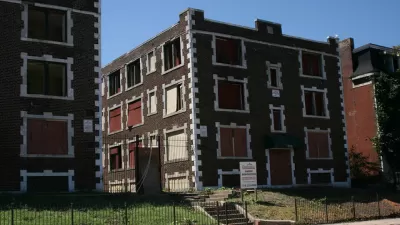A new report on eviction data from Kansas City reveals systematic factors related to the housing crisis.

Tara Raghuveer of the Kansas City Eviction Project discusses the findings of an analysis of eviction data from metropolitan Kansas City, Missouri, from 1999 to 2017. Eviction rates averaged about 9,000 a year consistently over this time period. But Raghuveer points out that these are only formal evictions, and the total number of forced moves is likely much higher.
Nonpayment of rent was the most common reason for eviction filings, and this figure has increased considerably since 2012. According to Raghuveer, race is an important factor related to evictions, with higher eviction rates among black residents and in black neighborhoods, even when income is held constant.
The study also found that almost all eviction cases that made it to the landlord-tenant docket in 2017 were decided in favor of the landlord. For cases from 2006 to 2016, most landlords had legal representation while very few tenants had lawyers. In addition, the rise of limited liability companies and the protections they provide to property owners have made it more difficult to hold landlords accountable, according to Raghuveer.
The large number of informal convictions, those happening outside of the court system, means these findings only provide part of the picture. In the long run, says Raghuveer, Kansas City and other cities facing similar challenges must pursue effective affordable housing policies and strategies to stem the flow of evictions.
FULL STORY: Kansas City Eviction Research Highlights the Need for Bold Municipal Solutions

Planetizen Federal Action Tracker
A weekly monitor of how Trump’s orders and actions are impacting planners and planning in America.

San Francisco's School District Spent $105M To Build Affordable Housing for Teachers — And That's Just the Beginning
SFUSD joins a growing list of school districts using their land holdings to address housing affordability challenges faced by their own employees.

The Tiny, Adorable $7,000 Car Turning Japan Onto EVs
The single seat Mibot charges from a regular plug as quickly as an iPad, and is about half the price of an average EV.

Seattle's Plan for Adopting Driverless Cars
Equity, safety, accessibility and affordability are front of mind as the city prepares for robotaxis and other autonomous vehicles.

As Trump Phases Out FEMA, Is It Time to Flee the Floodplains?
With less federal funding available for disaster relief efforts, the need to relocate at-risk communities is more urgent than ever.

With Protected Lanes, 460% More People Commute by Bike
For those needing more ammo, more data proving what we already knew is here.
Urban Design for Planners 1: Software Tools
This six-course series explores essential urban design concepts using open source software and equips planners with the tools they need to participate fully in the urban design process.
Planning for Universal Design
Learn the tools for implementing Universal Design in planning regulations.
Smith Gee Studio
City of Charlotte
City of Camden Redevelopment Agency
City of Astoria
Transportation Research & Education Center (TREC) at Portland State University
US High Speed Rail Association
City of Camden Redevelopment Agency
Municipality of Princeton (NJ)





























